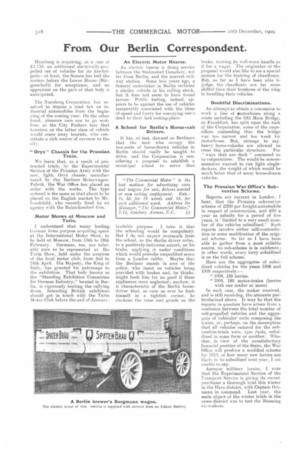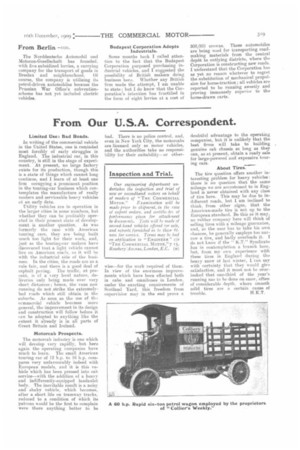From Our Berlin Correspondent.
Page 8

Page 9

If you've noticed an error in this article please click here to report it so we can fix it.
Hamburg is acquiring, at a t.ost of -E-1,750. an additional electrically-propelled set of vehicles for its lire-brigade—at least, the Senate has laid the motion before the Lower House (Biirgerschaft) for acceptance, and no Opposition on the part of that body is anticipated.
The Nurnberg Corporation has resolved to impose a road tax on industrial automobiles from the beginning of the coming year. On the other hand, pleasure cars are to go scotfree, as the City Fathers fear that x ation on the latter class of vehicle would scare away tourists, who constitute a rich source of revenoe to the city.
" Oryx " Chassis for the Prussian Train.
We learn that. as R result of protracted trials, by the Experimental Section of the Prussian Army with the new, light, Oryx chassis, manufactured by the Berliner MotorwagenFabrik, the War Office has placed an order with the works. The type ordered is the same as that about to be placed on the English market by Mr. Goodchild, who recently fixed up an agency with the Reinickendorf firm.
Motor Shows at Moscow and Turin.
I understand that many leading (..:erman firms purpose acquiring space at the International Motor Show, to be held at Moscow, from 15th to 18th February. Germans, too, are tolerably sure to be represented at the Turin. Show, held under the auspices of the local motor club, from 2nd to 24th April. His Majesty. the King of Italy, has granted his patronage to the exhibition. That body known as the "Standing Exhibition Committee for German Industry," located in Berlin, is vigorously beating the rallying drum. Intending British exhibitors should get in touch with the Turin Motor Club before the end of January.
An Electric Motor Hearse.
An electric hearse is doing service between the Stalmsdorl Cemetery, not far from Berlin, and the nearest railway station. Some two years ago, a funeral undertaker in Berlin included a similar vehicle in his rolling stock, but it does not seem to have found favour. Public feeling, indeed, appears to. he against the use of vehicles inseparably associated with the ideas of speed and hurry for conveying one's dead to their last resting-place.
A School for Berlin's Horse-cab Drivers.
It has, at last, dawned on Berliners that the men who occupy the box-seats of horse-drawn vehicles in Berlin should really he taught to drive, and the Corporation is considering a proposal to establish a municipal school to serve that
laudable purpose. 1. take it that the schooling would be compulsory. But I do not expect overmuch from the school, as the Berlin driver relies, to a positively-ludicrous extent, on his brake, applying it under conditions which would provoke unqualified scorn from a London cabby. Maybe that the Berliner stands in awe of the police, who insist on vehicles being provided with brakes and, he thinks, might book him for no good if these appliances were neglected; anyhow, it is characteristic of the Berlin horsedriver that, as soon as ever he finds himself in a tightish corner, he slackens the reins and grinds on the brake, turning its well-worn handle as if for a wager. The originator of the proposal would also like to see a special section for the training of chauffeurs. But, so far as I have been able to judge, the chauffeurs are far more skilful than their brethren of the whip in handling their vehicles.
Doubtful Discriminations.
An attempt,to obtain a concession to work a line of snotorbuse.s along a route including the Old Main Bridge, at Frankfort, has split upon the rock of the Corporation, some of the councillors contending that the bridge
was too narrow and too weak for motorbuses. But, strange to say, heavy horse-vehicles are allowed to cross this particular structure. For " ways that are dark " commend us to corporations. The would-be concessionnaire wanted to run light singledeckers. the weight of which would he much below that of many horse-drawn vehicles.
The Prussian War Office's Sub-, vention Scheme.
Reports are current in London, T hear, that the Prussian subvention scheme of £200 per freight-automobile in respect of construction, and 250 a year as subsidy for a period of five years, is ' limited to a very small number of the vehicles subsidized.' Such reports involve either self-contradiction or some modification of the origi nal scheme. o far as I have been able to gather from a most reliable source, no sub-scheme is in existence; in other words, every lorry subsidized is on the full scheme.
Here are the aggregates of subsidized vehicles for the years 1908 and. 1909 respectively :—
" 1908, 138 lorries.
"1909, 180 motor-trains (lorries with one trailer or more).
In each case, the maker received, and is still receiving, the amounts particularized above. '7•It may be that the reports in question have arisen from a confusion between the total number of self-propelled vehicles and the aggregate of vehicular units composing the trains, or, perhaps, on the assumption that all vehicles entered for the subvention-trials were, ipso facto, subsidized in some form or another. Whether, in view of the unsatisfactory fivaticial position of the State, the War Office will produce a modified scheme for 1.910. or how many new lorries are likely to be subsidized next year, I am unable to say.
Apropos military lorries. I note that the Experimental Section of the Transport Service is giving its recent purchases a thorough trial this winter in the Tfarz district, with Captain Ortmann in command. Last year, the main object of the winter trials in the same district was to test the Biles§ing snuw-shoes.
The Norddeutsche Automobil iind Motoren-Gesellschaft has founded, with five subsidized lorries, a carrying company for the transport of goods in Breslau and neighbourhood. Of course, the company is utilizing its petrol-driven automobiles because the Prussian War Office's subventionscheme has not yet included electric vehicles. Budapest Corporation Adopts Industrials.
Some months back I called attention to the fact that the Budapest Corporation purposed purchasing industrial vehicles, and I suggested the possibility of British makers doing business here. Whether any British firm made the attempt, I am unable to state ; but I do know that the Corporation's intention has fructified in the form of eight lorries at a cost of 300,000 crowns. These automobiles are being used for transporting roadmaking materials from the central depot to outlying districts, where the Corporation is constructing new roads. I understand that the Corporation has as yet no reason whatever to regret the substitution of mechanical propulsion for horse-traction ; all vehicles are reported to be running sweetly and proving immensely superior to the horse-drawn carts.
























